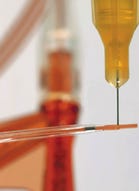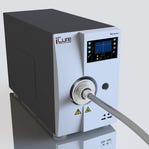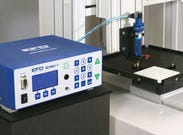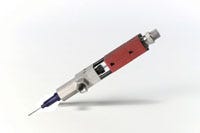March 22, 2011
 Electrically conductive adhesives
Electrically conductive adhesives
A line of electrically conductive pressure-sensitive adhesives (PSAs) is available from a producer of custom PSAs, tapes, coatings, specialty films, and laminates for medical device construction. Supplied by Adhesives Research to manufacturers seeking reliable bonds for consistent electrical interconnections, the customizable PSAs are compatible with a variety of materials. They provide a thin, uniform bond line; tailored volume and surface resistance; good cold-drop performance; and shock resistance. Easy and safe to use, the adhesives are manufactured in wide-format rolls and as laminates. Provided as single- and double-coated tapes, sheets, and die-cut parts, the adhesives demonstrate consistent electrical conductivity under variable temperature and humidity conditions and support conductivity between or across adhesive bonds. Customers can select the adhesive chemistry, adhesive thickness, form, construction, and type of release liner to suit their needs.
Adhesives Research Inc.
GLEN ROCK, PA
www.adhesivesresearch.com
 Catheter-assembly adhesive
Catheter-assembly adhesive
Formulated for fast, on-demand curing using the BlueWave LED Prime UVA spot-curing lamp, the 210-CTH medical device assembly adhesive cures tack-free in less than 0.4 seconds under LED exposure. This moisture-resistant adhesive from Dymax Corp. is designed to bond a variety of plastics used in the manufacture of catheters, including polycarbonate, polyurethane, ABS, and PVC, and is suitable for y-connector assembly, connector-to-tube bonding, and balloon bonding. The adhesive's ability to cure rapidly maximizes consistency and minimizes stress in catheter assembly. ISO 10993 approved, this flexible, light-curable adhesive does not contain solvents and is compatible with gamma, EtO, and E-beam sterilization methods. It also exhibits good adhesion to a variety of substrates.
Dymax Corp.
TORRINGTON, CT
www.dymax.com
 Dispensing pump
Dispensing pump
The fully programmable VMP electronic variable-displacement metering pump accurately dispenses ultraviolet (UV) radiation-sensitive fluids, including UV-curable assembly adhesives. Available from Fluid Metering Inc., the dispenser features a precision stepper motor that controls the pump speed and employs the manufacturer's patented CeramPump valveless piston pump design. Made of Type 316 stainless steel or opaque PVDF, its pump head keeps UV light from affecting process fluids in transit. A second stepper motor electronically adjusts the piston displacement; by varying the length of the piston stroke, dispense quantities can be finely tuned. This dispenser can be programmed for a variety of functions via a user-friendly touch screen interface that can control up to 16 pumps on a single bus; up to 128 metering devices can be controlled using a PLC or computer.
Fluid Metering Inc.
SYOSSET, NY
www.fmipump.com
 Thermal spot-curing system
Thermal spot-curing system
The iCure AS200 thermal spot-curing system is an in-line fiber-optic system that delivers heat in the form of infrared (IR) radiation to safely warm heat-sensitive plastics used in the manufacture of disposable medical devices. The portable unit from IRphotonics features pinpoint control accuracy for temperature-sensitive substrates and complex devices. Enabling the system to combine the advantages of thermal curing with the practicality of spot curing, an optical filter ensures that only mid-IR-spectrum light above 800 nm generates heat. Based on thin-film technology, this filter allows the unit to provide highly focused light energy for curing two-part glues without affecting thermoplastic substrates--even those that are highly colored or have absorbent matte or black surfaces. The system is used to spot-cure thermal epoxies, bond and fix plastic and glass components, fix lenses, temporarily fix miniature components, locally heat-weld thermoplastics, and perform microsoldering operations.
IRphotonics
HAMDEN, CT
www.irphotonics.com
 High-precision dispenser
High-precision dispenser
Designed to help medical device manufacturers maintain desired levels of productivity and quality, the Ultimus V dispenser and Optimeter flow-control device from Nordson EFD keep the amount of adhesive used in a medical device assembly process consistent as it gets thicker or thinner, or as the volume of fluid in the syringe decreases. When dispensing fluids with a range of viscosities, the dispenser automatically adjusts stored dispense settings to ensure that fluid is applied in a constant volume from deposit to deposit. To compensate for changing levels when thinner fluids are used, the flow-control device automatically adjusts airflow to maintain a uniform deposit size. Users can choose to have menus and prompts displayed in English, Chinese, French, German, Italian, Japanese, Korean, or Spanish and to set dispensing parameters in standard, metric, or SI units.
Nordson EFD
EAST PROVIDENCE, RI
www.nordson.com
 Positive-displacement valve
Positive-displacement valve
Featuring a slim design, high resolution, repeatability, and a dispense volume range of 0.0015 to 0.016 cm3 per cycle, the MV200 positive-displacement valve can handle a variety of fluids. Provided by PVA, the valve can dispense ultraviolet adhesives used to bond plastic, glass, and metal medical device components. It meters fluids volumetrically through the displacement of a mechanical rod. Dispense volume is always determined by the operator's mechanical setting and cannot be altered by changes in fluid viscosity, fluid pressure, temperature, or any other condition. The fluid-contacting portion of the 160 × 19 × 19-mm 8-oz valve is constructed entirely from FDA-approved Type 300 stainless steel, Teflon, and Kalrez. The valve can be employed as a handheld manual device or integrated as multiple close-set valves in space-restricted areas of high-volume automated production lines.
PVA
COHOES, NY
www.pva.net
 In-line curing QC system
In-line curing QC system
Used in medical device applications, the Loctite AssureCure system is an in-line unit designed to quantitatively assess the degree of cure of light-curing adhesives. Available from Henkel Corp. and easily integrated into production lines, the system features fiber-optic light sources, a light detector, and software that communicates with the user's PC or PLC. Because it is capable of confirming cures at a speed of 20 milliseconds per part, it can check 100% of production output, according to its manufacturer. Meeting the biocompatibility requirements of ISO 10993, the system is an alternative to destructive off-line testing and prevents the generation of scrap. It features a small footprint and can be positioned directly downstream from a production line's existing light-curing station.
Henkel Corp.
ROCKY HILL, CT
www.henkelna.com
About the Author(s)
You May Also Like


